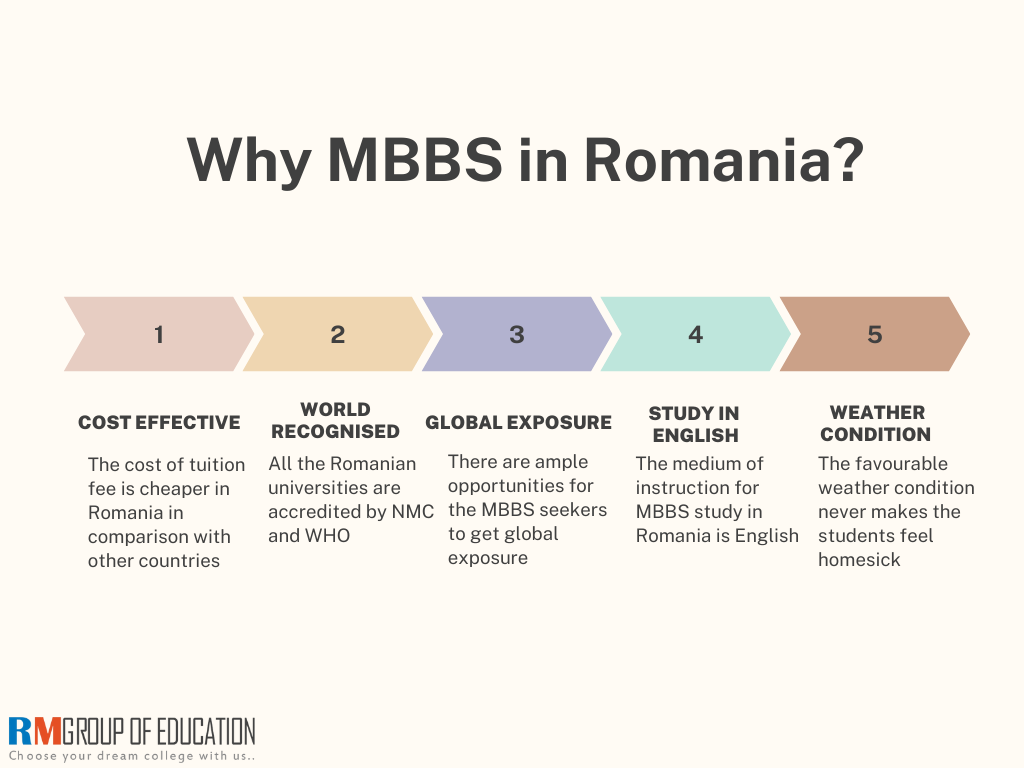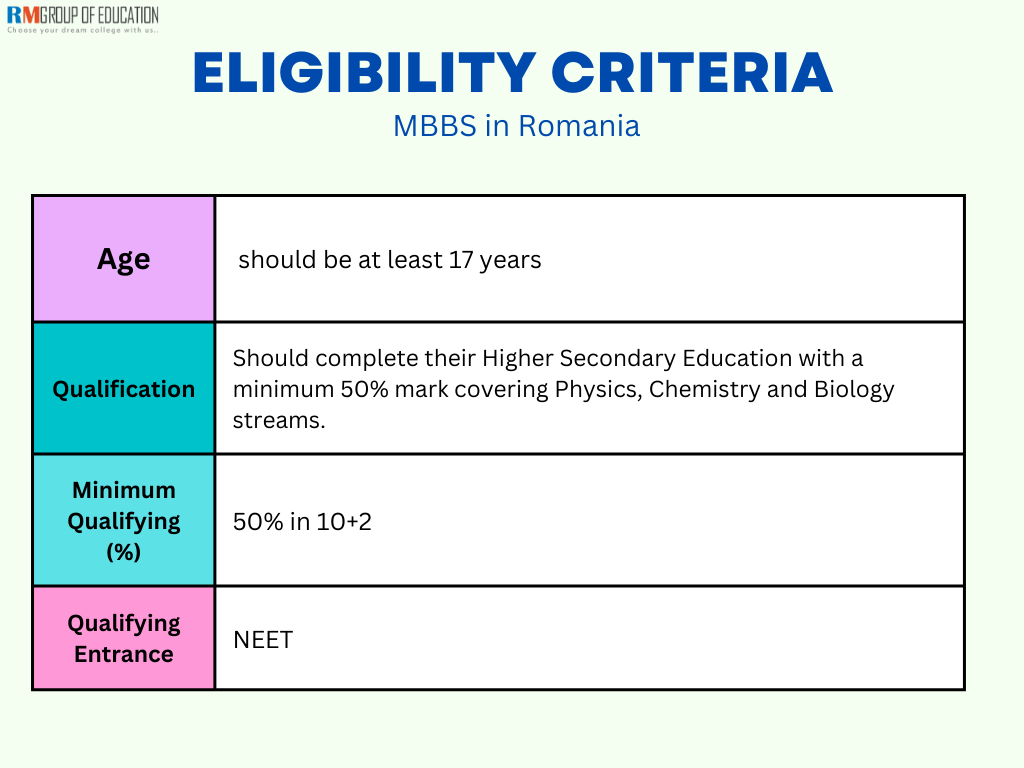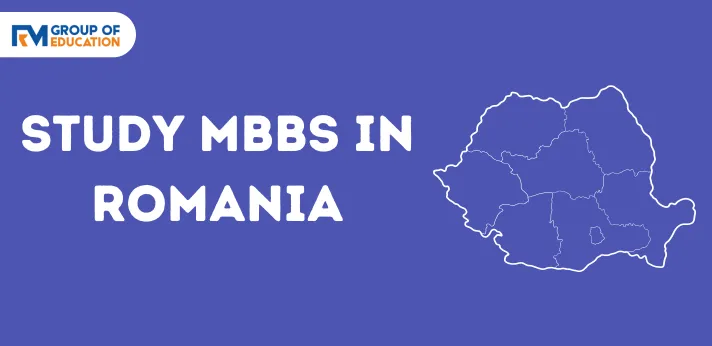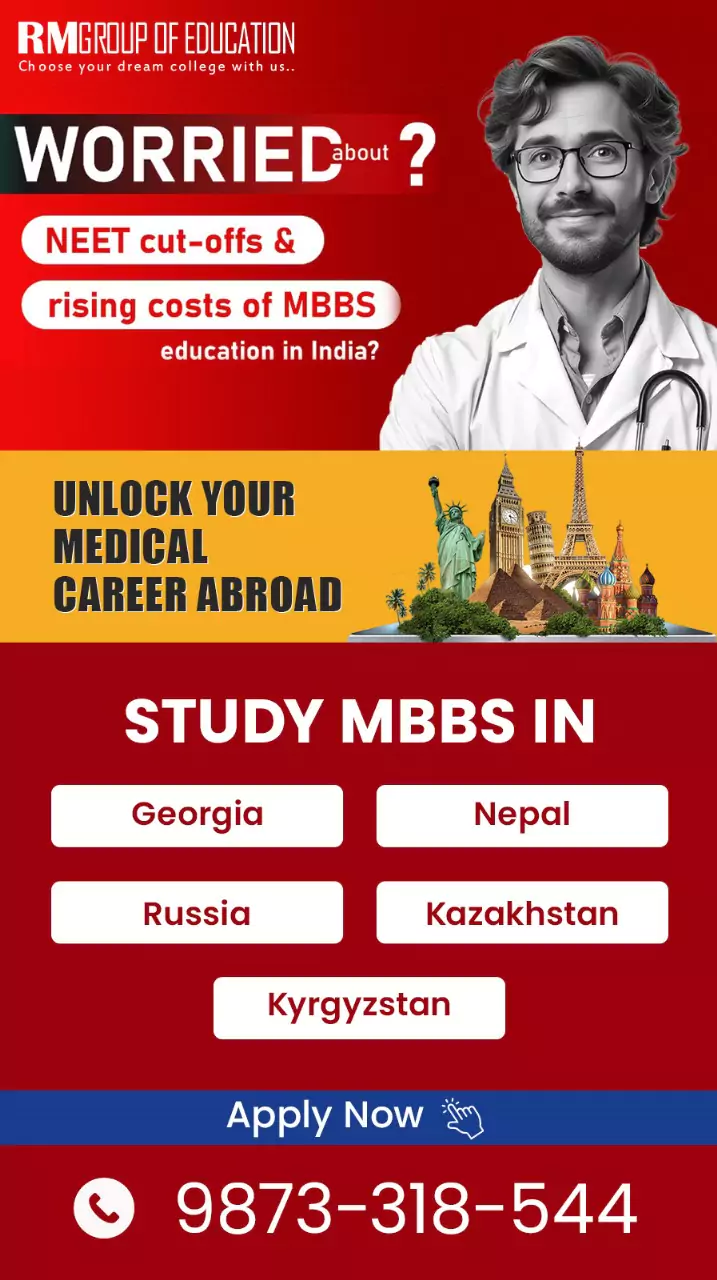Romania offers some of the finest MBBS colleges globally, with almost every university accredited by prestigious organizations like WHO, UNESCO, and NMC. This recognition makes Romania an excellent choice for studying MBBS. Moreover, Romania’s serene and picturesque environment makes it highly appealing to international students.
Pursuing MBBS in Romania is gaining popularity among Indian medical aspirants seeking to fulfill their dream of becoming doctors. Whether you’re determined to achieve your goal or seeking in-depth knowledge, studying in Romania is a growing trend in the field of medical education.
Subscribe to RM Group of Education Newsletter, Get Admission, Fees, Seats etc.
Contents
Country Summary
Romania, located in southeastern Europe, is renowned for Transylvania’s wooded area, encircled by the Carpathian Mountains. It shares borders with the Black Sea to the southeast, Bulgaria to the south, Ukraine to the north, Hungary to the west, Serbia to the southwest, and Moldova. With nearly 20 million inhabitants, Romania ranks as the 12th largest country and the 7th most populous member of the European Union.
| Population | 19,051,562 |
| Area | 238,398 km2 (92,046 sq mi) |
| Capital City | Bucharest |
| Language | Romanian |
| Climate | Romania has a temperate and continental climate with four distinct seasons. The average annual temperature is 11 °C (52 °F) in the south and eight °C (46 °F) in the north. |
| Literacy Rate | 98.8 % |
| Time Zone | UTC+2 (EET) UTC+3 (EEST) |
| Currency | Romanian leu (RON) |
| Religion | 84.79% Christianity, 9.01% refused to declare, 4.94% unavailable data, 0.8% irreligion, 0.44% others |
Quick Facts
Before reading the complete information about MBBS in Romania, let’s look at Quick facts.
| Courses Offered | Bachelor of Medicine and Bachelor of Surgery (MBBS) |
| Courses Duration | 6 Years (English Medium) 7 Years (Including Internship) |
| Basic Eligibility | 60% in 10+2 (UR) 40% (SC/OBC/ST) |
| Medium of Teaching | English, Romanian |
| Universities Recognition | NMC & WHO-accredited |
| Cost of Living in Romania | USD 250/Month |
| Minimum course fee | USD 4000/Year |
| Entrance Exam | NEET Qualified (Only) |
Courses offered in Romania:
The most popular fields of MBBS in the medical universities/colleges of Romania are listed below:
| General Medicine | Surgery |
| Pediatrics Surgery | Nursing |
| Pharmacy | PG |
| Dentistry | – |
Why Study MBBS in Romania?

Eligibility Criteria
MBBS in Romania has been one of the top preferred destinations for international students to pursue their Medical Degree Courses. If you too want to study MBBS in Romania, check the eligibility below.
| Age | You are at least 17 years old on or before 31st December of the admission year. No Upper Age Limit. |
| Qualification | Admission Seekers should complete their Higher Secondary Education with a minimum 50% mark covering Physics, Chemistry and Biology streams. |
| Minimum Qualifying (%) | 50% in 10+2 (UR) 45% (SC/OBC/ST) |
| Qualifying Entrance | NEET (For Indian Students) |
| Medium of Teaching | English |
| Duration of Course | 6 Years |
| Minimum Tuition Fee | USD 3000/ Per Year |
| Maximum Tuition Fee | USD 5000/ Per Year |
| Living Costs in Romania | USD 10/Per Month |
| Admission Starts | February |
Graphical Representation of Eligibility Criteria

Admission Procedure
If you want admission to Romania, you must qualify for the National Eligibility Entrance Exam (NEET). One must remember that you only have to be eligible for the exam. Here are the valuable resources for NEET Exam that will help you boost preparing for the NEET exam.
Documents Required
Before admission to Medical college Romania, please do not forget to carry all these related documents. Passport (Minimum 18 months validity).
- Birth Certificate. 10th Certificate & Mark sheet.
- 12th Certificate & Mark sheet.
- Ten passport size Photographs
- Official Invitation letter from the Medical University of Romania.
- Authorization of all documents from the Ministry of External Affairs, New Delhi.
- Legalization of all documents from the Romanian Embassy.
- Visa fees.
- Bank receipt of University 1st year Tuition fee (required for some Universities).
- Medical test documents.
MBBS Syllabus in Romania
Before going to Romania for Medical, studies compare the MBBS in the Romania Syllabus of some of Romania’s top-ranked, NMC-approved medical universities.
| First Year | Anatomy and Embryology, Biochemistry, Biology, Biophysics, Medical Informatics and Biostatistics, Physiology, History of Medicine, Medical Sociology & Medical Psychology, Romanian Language, Physical Education, Abilities in Medical Maneuvers, Summer Practice, Basic Medical Skills, Electives |
|---|---|
| Second Year | Pharmacology, Morphopathology, Physiopathology, Medical Semiology, Surgical Semiology Medical Research Methodology and Medical Biostatics, Primary Health Care, Summer Practice, Basic Medical Skills, Electives |
| Third year | Pharmacology, Morphopathology, Physiopathology, Medical Semiology, Surgical Semiology Medical Research Methodology and Medical Biostatics, Primary Health Care, Summer Practice, Basic Medical Skills, Electives |
| Fourth Year | Internal Medicine, General Surgery, Orthopedics and Traumatology, Urology Radiology and Nuclear Medicine, Oncology and Hematology, Anesthesia and Intensive Care Medicine and Emergency Medicine, Hygiene, Clinical Biochemistry, Summer Practice, Basic Medical Skills, Electives |
| Fifth Year | Internal Medicine, Pneumatology, Endocrinology, Ophthalmology, Pediatrics, Neonatal Care, Labor Medicine and Occupational Diseases Otolaryngology, Neurology, Pediatric Surgery and Orthopedics, Summer Practice, Basic Medical Skills, Electives |
| Sixth Year | Obstetrics, Gynaecology and Neonatology, Psychiatry and Pediatrics Psychiatry, Dermatology, Infectious Diseases and Clinical Microbiology, Forensic Medicine, Family Medicine and Genetics, Rheumatology – Balneo – Physiotherapy and Rehabilitation, Public Health and Sanitary Management, Epidemiology, Cranial and Maxillofacial Surgery, Graduation Thesis |
Recognition of Romania Medical College
Checking the affiliation, recognition and other affiliating parameters are the most critical factors that decide good and the best medical college. Medical colleges in Romania are affiliated with these authorities.
- Ministry of Education, Romania.
- NMC
- WHO (World Health Organization)
- ECFMG (Educational Commission for Foreign Medical Graduates)
- WFME (World Federation for Medical Education)
- FAIMER (The Foundation for Advancement of International Medical Education and Research)
MBBS Colleges in Romania
Below is the updated 2023-24 of all Medical or MBBS Colleges in Romania officially made by India’s Medical Council.
| College Name | Course Offered | Official Website |
| GR T. Popa University of Medicine and Pharmacy Iasi | MBBS (6 Years) | http://www.umfiasi.ro/ro |
| “Ovidius” University of Constanta | MBBS (6 Years) | http://www.umft.ro/ |
| “Ovidius” University of Constanta | MBBS (6 Years) | https://www.univ-ovidius.ro/ |
| Iuliu Hațieganu University of Medicine and Pharmacy | MBBS (6 Years) | http://www.umfcluj.ro/ |
| Carol Davila University of Medicine and Pharmacy | MBBS (6 Years) | https://umfcd.ro/ |
| University of Oradea | MBBS (6 Years) | https://www.uoradea.ro/ |
| The University of Medicine and Pharmacy of Craiova Romania | MBBS (6 Years) | https://www.umfcv.ro/en |
Fee Structure
Here in this section, we provide information about the MBBS in Romania Fee structure of the MBBS program. Let’s have a look.
| Universities Name | Annual Tuition Fee in INR |
| Ovidius University Constanta | 2,96,200/Year |
| Carol Davila University of Medicine and Pharmacy | 6,17,083/Year |
| Cluj Napoca Medical University | 3,90,000 /Year |
| Gr Popa Iasi University | 6,17,083/Year |
| Arad University | 3,40,000 /Year |
| The University of Medicine and Pharmacy of Craiova Romania | 4,11,388/Year |
| Iuliu Hațieganu University of Medicine and Pharmacy | 4,93,666/Year |
| “Victor Babes” University of Medicine and Pharmacy | 4,93,666/Year |
| University of Oradea | 5,15,058/Year |
NOTE: The mentioned fee is approximate and will be subject to change.
Scholarships in Romania
Even Romanian universities provide scholarships to overseas students. Scholarships will be made available to candidates through bilateral cooperation agreements. This benefit will be granted to candidates depending on their performance during their Medicine Studies in Romania. Students pursuing an MBBS degree will get a monthly scholarship of $50 USD. Furthermore, the cost of school is waived for those awarded a scholarship. The scholarship does not cover the cost of overseas transportation or personal expenditures. The Ministry of Foreign Affairs also offers scholarships to students. Romanian students apply for scholarships to the Departments for Romanians Abroad.
Advantages and Disadvantages of Studying MBBS in Romania
Romania ranks in the 5th position in the all-time medal count at the International Mathematical Olympiad, with 316 total medals dating back to 1959. Romania has achieved the highest team score in the competition, after China and Russia, and right after the United States and Hungary.
Advantages of Studying MBBS in Romania
- No Entrance test is required to study in Medical Universities in Romania (Only NEET Qualification is enough).
- No capitalization fee.
- The Indian students seeking admission are admitted to those recognized by the medical council of India for screening tests conducted by NMC.
- Wide range of possibilities and broad exposure to clinical practice due to highly equipped multi-profile hospitals.
- Colleges in Romania don’t ask for any donation at the time of admission.
- The tuition fee is relatively low and affordable.
- Elite bodies like WHO and NMC acknowledge medical colleges in Romania.
- The cost of living for students is relatively low too.
Disadvantages of studying in Romania
- One might have to put extra effort into learning the Romanian Language after the class hour.
- The entire Visa process for Romania can be callous as it can take more than two months after document submission to the concerned embassy.
- The climate of the country is cold most of the time. Therefore, it might be hard for some students to adapt.
- Those who wish to study and work together to cover their expenses may face difficulties because it requires self-study and concentration.
Frequently Asked Questions (FAQs)
Is Romania Good for medical studies?
Romania is well-known for providing world-class education at a very considerable cost.
Why is MBBS cheap in Romania?
The cost of pursuing MBBS in Romania is low because the Romanian government provides subsidies for education.
Can poor Indian students study abroad?
Of course, there is no rich and poor when it comes to education; it is all about knowledge. Several scholarships are open to students, and the government of India also provides a scholarship option for academically intelligent students.

